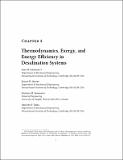Thermodynamics, Exergy, and Energy Efficiency in Desalination Systems
Author(s)
Sharqawy, Mostafa H.; Lienhard, John H.; Mistry, Karan Hemant; Thiel, Gregory P.
DownloadChapterMaster.pdf (7.551Mb)
OPEN_ACCESS_POLICY
Open Access Policy
Creative Commons Attribution-Noncommercial-Share Alike
Terms of use
Metadata
Show full item recordAbstract
Desalination is the thermodynamic process of separating fresh water from water that contains dissolved salts. This chapter introduces the concepts and methods required for thermodynamic analysis of desalination systems. Thermodynamic laws are summarized along with the chemical thermodynamics of electrolytes. Exergy analysis is introduced. The work and heat of separation are dened, and the roles of entropy generation and exergy destruction are identied. Important sources of entropy generation are discussed. Examples are given for the application of these methods to several representative desalination systems.
Date issued
2017Department
Massachusetts Institute of Technology. Department of Mechanical EngineeringJournal
Desalination Sustainability: A Technical, Socioeconomic, and Environmental Approach
Publisher
Elsevier
Citation
J.H. Lienhard V, K.H. Mistry, M.H. Sharqawy, and G.P. Thiel, “Thermodynamics, Exergy, and Energy Efficiency in Desalination Systems,” in Desalination Sustainability: A Technical, Socioeconomic, and Environmental Approach, Chpt. 4, H.A. Arafat, editor. Elsevier Publishing Co., 2017.
Version: Author's final manuscript
ISSN
: 78-0-12-809791-5